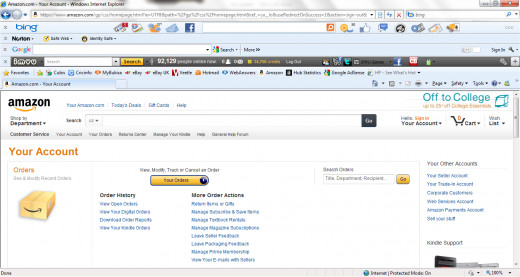Internet shopping safety tips

Phishing, fraudulent websites, identity theft and online scams are merely a fraction of the sum of threats that internet shoppers face on a daily basis.
These online dangers render protecting your privacy and information especially important while conducting any online transactions.
The use of fraudulent or false business websites is a common strategy for cyber criminals.
They bait unsuspecting internet shoppers with websites that appear convincing and legitimate for the express purpose of collecting your personal information.
The damage is complete when they use your compromised information to defraud you.
A simple and effective way to have a safe online shopping experience is to only visit websites that are reputable, legitimate and secure.
Assess the reputation of e-commerce sites
There is a lot of information online about everything – including information on websites. You can almost guarantee that a questionable website or e-business would be discussed on web forums or consumer websites.
If you are uncertain about a specific business or website, basic web research may give you a clue. Of course, the information about these sites may only be unsubstantiated opinions, established and reputable sources like bizrate.com offer helpful evaluations.
Examine seals of approval
Proper, reputable sites are not judged merely by name and layout. They also bear badges of approval that certify their legitimacy and security.
The Better Business Bureau or TrustE seals establish that a website or business adheres to standards regarding the use of personal information.
There are also SSL certificates and other indications that a website is secure and less vulnerable (although not invulnerable) to cyber threats.
Use a payment service
To counter the issues internet shoppers may have with using their credit cards all over the web, sites such as PayPal or WorldPay were created. Such services are invaluable as they allow shoppers to perform online transactions without revealing their personal information on each occasion.
Paypal is widely accepted across websites, although some do not facilitate payments from such services. Where available, using these services provides a safe curtain for conducting transactions.

Use a credit card with low credit limits
To reduce exposure and risk from shopping online, it is helpful to have a single credit card designated for online shopping.
Whenever you shop online – regardless of how reputable or secure the website is – you are taking a risk, however slim.
Using a credit card with a reasonably low credit limit means that even if your information is used by cyber criminals, they would have limited returns from their criminal activity.
What is ‘low’ varies among individuals, but the question to ask is “How much can I stand to lose if my credit card information is compromised?”
Data protection
Apart from logos and seals, a less obvious way to check that a website has a higher level of security is to check for an ‘s’ after http in the web address (https).
Additionally, you can verify that a lock icon appears on the status bar and that it appears to be in the locked position. If these features are not visible, you should avoid entering personal information on the website, since it is unlikely to be properly secured.
Make the most of your web browser security features and internet security software
Web browsers and internet security software can also help e-shoppers identify suspicious websites. They keep records of activity across the web and accept reports on websites.
Internet Explorer, for example, has a SmartScreen filter that identifies safe websites and facilitates reports of unsafe ones. White checkmarks on a green background are another indication that a website is safe and secure.
Keep everything up-to-date
While the aforementioned strategies are useful and effective, it is your duty to keep your internet browsers, internet security software and operating systems up-to-date.
Operating Systems and browsers have regular security updates that help to protect your computer against the latest cyber threats. Having a clear understanding of what to do if your information is compromised can be very effective in damage-limitation in that event.
While online shopping is easy and innovative, one bad experience can deter you from utilizing the many benefits of shopping on the internet. However, if you follow the tips in this article, you will be able to continue shopping safely and securely from the comfort of your home.








